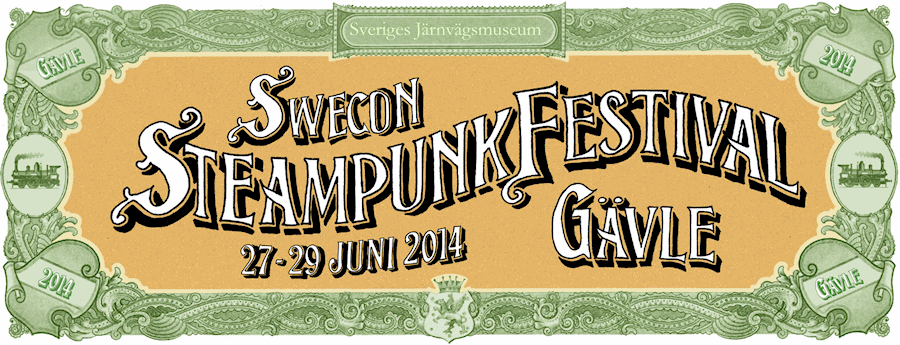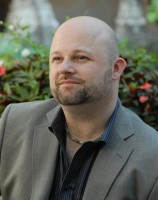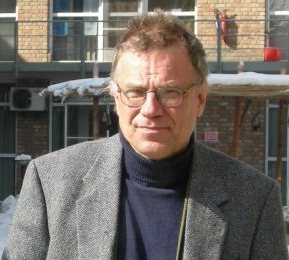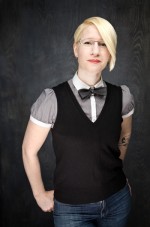Now it’s only a couple of weeks left until the festival starts. There will be amusing discussions, a fantastic ball, a miscellaneous market, and much, much more. The most important aspect, however, are our guest – both you who buys a membership and sits in the audience, and our guests who partly will come a long way in order to participate in discussions and interviews. Round Christmas, we have already presented our guests of honour. Now we would like to continue with Nene Ormes, Elin Holmerin, Karin Tidbeck, Anders Blixt, and Steven Savile. So that there is even more for you to look forward to.
Elin Holmerin is a writer, graphic designer, editor, mother of two, teacher, and last but not least one of our guests at the Steampunkfestival. I met her in a café at Gamla Stan, an hour before her signing session at Sf-bokhandeln started.
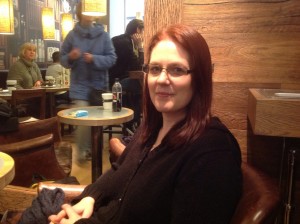 1. Probably, this is not your first autograph session. What was it like when you were invited to have one for the first time? And how does it feel now?
1. Probably, this is not your first autograph session. What was it like when you were invited to have one for the first time? And how does it feel now?
The first time, it was actually me who asked whether I could participate in an autograph session. Back then I was quite nervous. I am always a little nervous, even today. Every writer is. Always. One simply doesn’t know whether people will show up… It’s hard to say how it will turn out.
2. How would it feel if nobody came? Would you continue with your writing, or would you interpret this as a sign of going in a wrong direction?
One must continue then. I know well that there are people out there who buy my books, so even if there was nobody who came… At one’s first signing, even well-known people have to wait for some hours. At my first signing, there came between four and six people, which I thought was very sad, while the book seller thought this very good. Even if you’re feeling disappointed or sorry: just keep on writing.
3. You have founded a publishing house called “Undrentide”. What does it mean?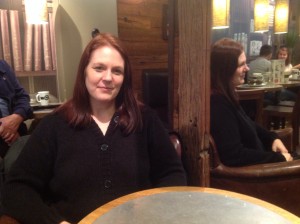
It’s an old English word that stands for the time after lunch. I have read a tale about a queen who eats lunch and then lies down in a grove and falls asleep. When she gets up again, she has gone mad. People were afraid they would go insane if they slept after lunch. So basically, “Undrentide” means “Lunchtime”.
4. As a publisher, you work quite a lot with other people’s texts; has this had an influence on your own writing?
Yes and no. As a matter of fact, I have not written for quite a long time, my last book “Sår” was published in 2012, so it’s quite hard to anticipate how it will be. But one is influenced of course, one gets new inspirations, thinks “Sure, you can do it this way!” The biggest influence, however, is that I concentrate more on grammar, diction, such details. Otherwise, one comes into a bad state. It is hard to read finished books. When I was writing my own books, I was reading less, although this was most because I lacked time.
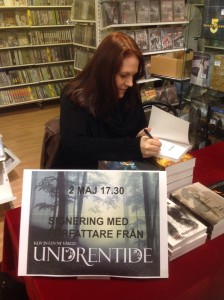 5. Your first book was published with another publishing house, while you published the second and third one yourself.
5. Your first book was published with another publishing house, while you published the second and third one yourself.
Yes. It felt safer, I have more control of my own. My father is a graphic designer, so he took care of the outer form. But being your own publisher also bears a certain uncertainty; one becomes blind for one’s own text. Small mistakes and so on. But it’s still better to be on your own. When my first book was published, there was no one who informed me “this is happening now” and so on. It’s not great not to get answers.
6. Which criteria does a book need to fulfill in order for you to publish it? What is a good book according to you?
It must have something that sticks with you: interesting story, language, something. It’s also good if it stands a little bit outside the traditional fantasy genre, outside the cliché. Outside the standard.
7. What three books by other writers are or have been important for you?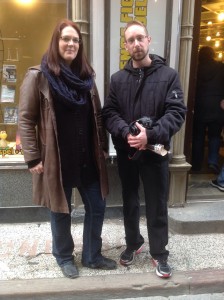
I like classics. Wuthering Heights has been with me for a long time. Though I don’t know whether I would like it if I read it again today. Furthermore, I like Terry Pratchett’s books. They werethe first fantasy books I read. I think I started with “Eric”, although it is not the first one in the series. They are so mad, you can do whatever you want in them. A third author… There is a Vietnamese author, Nguyen Huy Thiep, who writes magic realism. When one reads his books, they seem so commonplace, but there are elements in them that make one think: ”But, wait…”
8. Do you write on your computer or by hand?
I write the first sketch by hand, onto such A5-booklets you use in school. I like to write in bed – draft first chaotic sketches without any system at all, scenes as they come up. I arrange them later on. Typing them on my computer is only a second step.
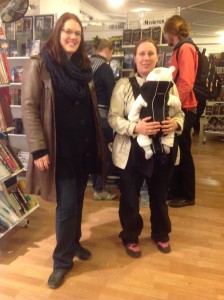 9. You have said in another interview that your books’ origins lie in Swedish myths. How important is Sweden and its historical and cultural heritage for you as a writer?
9. You have said in another interview that your books’ origins lie in Swedish myths. How important is Sweden and its historical and cultural heritage for you as a writer?
Very much. It feels like a huge treasure fo gold which is quite unknown generally. There is so much popular belief and old myths one could make much more of. But it comes gradually. I think Kristina Hård is one of the most recent ones, she uses trolls. All kinds of old histories, Babylonian myths, Chinese stories, are exciting. It’s less about it being Swedish than about it being old.
10. What book took you most time to write?
The first book, “Eldfloder”, took me most time to write because it was so unfamiliar. I hadn’t written that way before. I have always written, short stories, school exercises, just for the fun. At first, it was supposed to become a novella, and then I continued, and the guy I was working with thought, that it was too short, that I should write more. It took me three years. There are noticeable differences between the language of the first and the final sketch. I think it would differ as well if I wrote it today. Actually, there are plans to redact “Eldfloder” and edit a new edition in my own publishing house. At first I thought it might be a good idea to do it for Swecon, but now this seems to be quite unrealistic. I might well take some more years.
11. What do you do if you don’t work or do something job-related?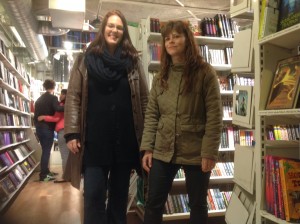
I like computer games, fantasy games to be more precise. The majority of my spare time is dedicated to my publishing house, but of course I also enjoy being with my family.
12. What is your favourite place in Sweden?
The woods. All kinds of woods. Dark and mossy woods.
